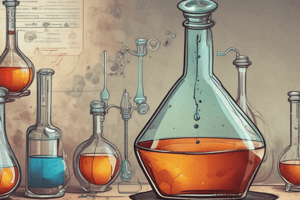Podcast
Questions and Answers
What factor affects both the efficiency of alcohol preparation and the reaction outcome?
What factor affects both the efficiency of alcohol preparation and the reaction outcome?
- Substrate properties (correct)
- Solvent disposal methods
- Safety protocols
- Choice of catalyst
Which factor does NOT influence the yield and selectivity of the target alcohol?
Which factor does NOT influence the yield and selectivity of the target alcohol?
- Reaction temperature
- Substrate structure
- Color of the reagent (correct)
- Catalyst used
What is essential for minimizing risks when using strong reducing agents in alcohol preparation?
What is essential for minimizing risks when using strong reducing agents in alcohol preparation?
- Proper disposal of solid waste
- Utilization of protective equipment (correct)
- Maintaining a low temperature environment
- Increasing pressure in the reaction vessel
In the context of alcohol synthesis, what does the specific mechanism depend on?
In the context of alcohol synthesis, what does the specific mechanism depend on?
Which application is NOT commonly associated with alcohols?
Which application is NOT commonly associated with alcohols?
What is the primary purpose of adding an acid catalyst in the hydration of alkenes?
What is the primary purpose of adding an acid catalyst in the hydration of alkenes?
Which reducing agent is capable of converting carboxylic acids to primary alcohols?
Which reducing agent is capable of converting carboxylic acids to primary alcohols?
In the Grignard reaction, what is formed when a Grignard reagent reacts with a carbonyl compound?
In the Grignard reaction, what is formed when a Grignard reagent reacts with a carbonyl compound?
Which of the following statements about the reaction of organometallic compounds is correct?
Which of the following statements about the reaction of organometallic compounds is correct?
What does Markovnikov's rule state in the context of alkene hydration?
What does Markovnikov's rule state in the context of alkene hydration?
Which of the following methods is NOT typically used to prepare alcohols?
Which of the following methods is NOT typically used to prepare alcohols?
When primary amines react with alkyl halides, what compound is usually produced as a byproduct?
When primary amines react with alkyl halides, what compound is usually produced as a byproduct?
Which of the following alcohol preparation methods is best known for producing tertiary alcohols?
Which of the following alcohol preparation methods is best known for producing tertiary alcohols?
Flashcards
Substrate in Alcohol Preparation
Substrate in Alcohol Preparation
The starting molecule used to make an alcohol. Its structure influences how easily and efficiently the alcohol can be made.
Reagents in Alcohol Preparation
Reagents in Alcohol Preparation
The specific chemicals used to turn a starting material into an alcohol, like catalysts and reducing agents.
Reaction Conditions in Alcohol Preparation
Reaction Conditions in Alcohol Preparation
The conditions like temperature, pressure, and solvent used during alcohol preparation which affect how much alcohol is produced and whether other unwanted molecules form.
Mechanism of Alcohol Formation
Mechanism of Alcohol Formation
Signup and view all the flashcards
Reducing Agent in Alcohol Preparation
Reducing Agent in Alcohol Preparation
Signup and view all the flashcards
Hydration of Alkenes
Hydration of Alkenes
Signup and view all the flashcards
Reduction of Carbonyl Compounds
Reduction of Carbonyl Compounds
Signup and view all the flashcards
Grignard Reaction
Grignard Reaction
Signup and view all the flashcards
Alkylation of Amines
Alkylation of Amines
Signup and view all the flashcards
Reaction of Organometallic Compounds
Reaction of Organometallic Compounds
Signup and view all the flashcards
Markovnikov's rule
Markovnikov's rule
Signup and view all the flashcards
What are Alcohols?
What are Alcohols?
Signup and view all the flashcards
What are the applications of Alcohols?
What are the applications of Alcohols?
Signup and view all the flashcards
Study Notes
Introduction to Alcohol Preparation
- Alcohols are essential organic compounds with diverse applications across industries. They serve as solvents, fuels, and crucial intermediates in chemical synthesis.
- Several methods exist for alcohol preparation, each with varying advantages and disadvantages regarding yield, selectivity, and safety considerations.
- The chosen preparation method depends on the desired alcohol, available starting materials, and practical resource limitations.
Methods for Alcohol Preparation
- Hydration of Alkenes:
- This method involves adding water (H₂O) across a carbon-carbon double bond (C=C) in an alkene.
- Requires an acid catalyst, such as sulfuric acid (H₂SO₄) or phosphoric acid (H₃PO₄).
- Markovnikov's rule influences regioselectivity, favoring hydroxyl group addition to the more substituted carbon atom.
- Example: Ethene reacting with water to form ethanol.
- Reduction of Carbonyl Compounds:
- This method involves reducing aldehydes or ketones to form alcohols.
- Common reducing agents include lithium aluminum hydride (LiAlH₄) and sodium borohydride (NaBH₄).
- LiAlH₄ is stronger, reducing carboxylic acids to primary alcohols, while NaBH₄ is milder, suitable for aldehydes and ketones without affecting other functional groups.
- Example: Reduction of propanal (an aldehyde) to propan-1-ol (a primary alcohol).
- Grignard Reaction:
- The Grignard reaction uses a Grignard reagent (organomagnesium halide) to add to a carbonyl compound (aldehyde or ketone).
- The resultant intermediate is then hydrolyzed to yield an alcohol.
- This method effectively produces various alcohols, including tertiary alcohols, challenging to prepare using other methods.
- Example: Reaction of methylmagnesium bromide with propanone to form 2-methylpropan-2-ol.
- Alkylation of Amines:
- Alkylating amines can produce alcohols as byproducts.
- Primary amines reacting with alkyl halides often give alcohols as a side product.
- Reaction of organometallic compounds:
- Reactions between organometallic compounds and various compounds (e.g., halides) can yield alcohols.
Factors Affecting Alcohol Preparation
- Substrate Properties: The starting material's structure (alkene, carbonyl compound, or other) affects reaction outcome and efficiency.
- Reagent Properties: The catalyst and reagent choices directly influence yield and selectivity in alcohol production.
- Reaction Conditions: Reaction temperature, pressure, and solvent polarity impact reactant conversion into the desired product and minimize byproduct formation.
Mechanism of Alcohol Formation
- The specific mechanism depends on the chosen alcohol synthesis method.
- Understanding the detailed reaction mechanisms is key to predicting the final product's properties and understanding the reaction pathway.
Safety Concerns in Alcohol Preparation
- Handling strong reducing agents (e.g., LiAlH₄) requires caution due to their reactivity and fire hazard potential.
- Safety protocols, including protective equipment and proper ventilation, are crucial to prevent accidents.
- Waste disposal must adhere to environmental regulations.
Applications of Alcohols
- Alcohols have widespread utility in various industries.
- Common uses include solvents, fuels, and intermediates in chemical synthesis.
- Applications extend to perfumes, pharmaceuticals, and cleaning agents, and specific materials with desired properties rely on certain alcohol formulations.
Studying That Suits You
Use AI to generate personalized quizzes and flashcards to suit your learning preferences.




